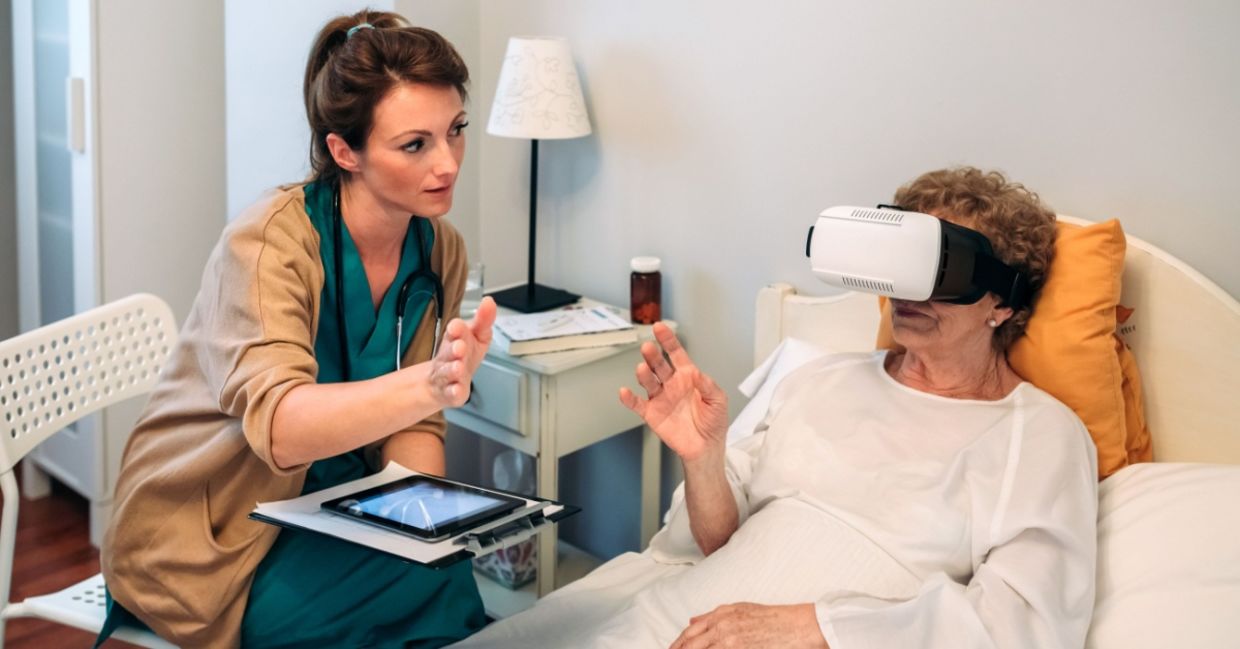
(David Pereiras / Shutterstock.com)
Today’s doctors, situated at the nexus of scientific knowledge and compassionate care, find themselves facing daily challenges. From diagnosing complex conditions to navigating sensitive conversations about treatment options, each scenario demands not just clinical expertise but also a deep well of empathy to truly understand and support patients on their healthcare journey. The Times of Israel reports that among the latest scientific innovations, Virtual Reality (VR) stands out as a powerful tool not only in medical training but also in enhancing doctor empathy. Israeli start-up OtheReality has taken the lead in this domain, leveraging VR technology to revolutionize the way medical professionals understand and empathize with their patients.
Bridging the empathy gap
One of the fundamental challenges in healthcare has been bridging the empathy gap between doctors and patients. Despite their expertise, doctors can sometimes struggle to fully comprehend the physical and emotional experiences of their patients. According to Aurora Israel, this is where OtheReality steps in, offering immersive VR training that allows medical staff to gain a patient's perspective firsthand.
“The doctor needs to look at the patient as a person with a problem and not as a problem,” Yotvat Palter-Dycian, co-founder and chief operating officer of OtherReality told The Times of Israel.
The core idea behind OtheReality's approach is to create empathy-driven simulations that enable doctors and healthcare professionals to see and feel the world through their patients' eyes. By wearing VR headsets, medical staff can step into simulated scenarios that mimic real-life patient experiences. This includes everything from routine medical consultations to more complex situations like chronic pain management or end-of-life care.The impact of this technology on doctor empathy is profound. It goes beyond textbook knowledge or observational learning; VR allows doctors to embody the challenges and emotions that patients face daily. This immersive experience fosters a deeper understanding of patients' needs, fears, and concerns, leading to more empathetic and patient-centered care.
Hands-on VR training
OtheReality's VR platform is designed with versatility in mind, catering to various medical specialties and scenarios. For instance, in emergency medicine, VR simulations can replicate high-stress situations such as trauma care or resuscitation efforts. This hands-on training helps doctors develop not only clinical skills but also the ability to remain calm and compassionate under pressure.
“A lack of empathy is affecting everyone everywhere — globally, not only in Israel. It’s not only in the healthcare field. It also affects education, the business setting, and much more. There is a lot of research on this,” OtheReality founder and chief creative officer Motti Neiger, a professor of communications at Bar-Ilan University, explained to The Times of Israel, adding,“In the healthcare field, we know that this lack of empathy leads to lower patient satisfaction, a lack of patient compliance with medical instructions, and higher hospital readmission rates. It also leads to more malpractice suits, as well as increased dissatisfaction and burnout among medical staff.”
Interdisciplinary care coordination
OtheReality's approach extends beyond individual doctors to entire healthcare teams. By creating collaborative VR environments, multiple professionals can engage in realistic patient simulations, enhancing teamwork, communication, and interdisciplinary care coordination. This collective immersion in patient scenarios promotes a holistic approach to healthcare delivery.
OtheReality's commitment to advancing healthcare through VR extends beyond training modules. The company also collaborates with healthcare institutions to develop customized VR solutions tailored to specific patient populations or therapeutic interventions. For example, VR programs for pediatric patients can help alleviate anxiety and fear during medical procedures by creating immersive, distraction-based experiences.
The potential for VR in healthcare goes beyond empathy enhancement. OtheReality's technology also contributes to reducing medical errors, improving patient outcomes, and enhancing overall patient satisfaction. By integrating VR into the fabric of medical education and practice, we are witnessing a paradigm shift towards more humane and empathetic healthcare delivery.
“We immediately understood that this is a great tool, especially for obstetricians and gynecologists. We have many staff members who are from the other gender [than the patients]. So by definition, they couldn’t have experienced the medical conditions associated with our profession,” Prof. Eran Weiner, chair of obstetrics and gynecology at Wolfson Medical Center in Holon told The Times of Israel.
As the healthcare industry continues to embrace digital transformation, initiatives like OtheReality's VR training pave the way for a more compassionate and patient-centric future. By empowering doctors with the tools to truly understand and empathize with their patients, proffesionals can create a healthcare system where empathy is not just a virtue but a fundamental aspect of quality care.
YOU MIGHT ALSO LIKE:
International Doctors Show Support for Israel During Challenging Times
New York City Medical School Eliminates Tuition
Hero Doctor Lets Patients Pay For Surgery With Volunteer Work







